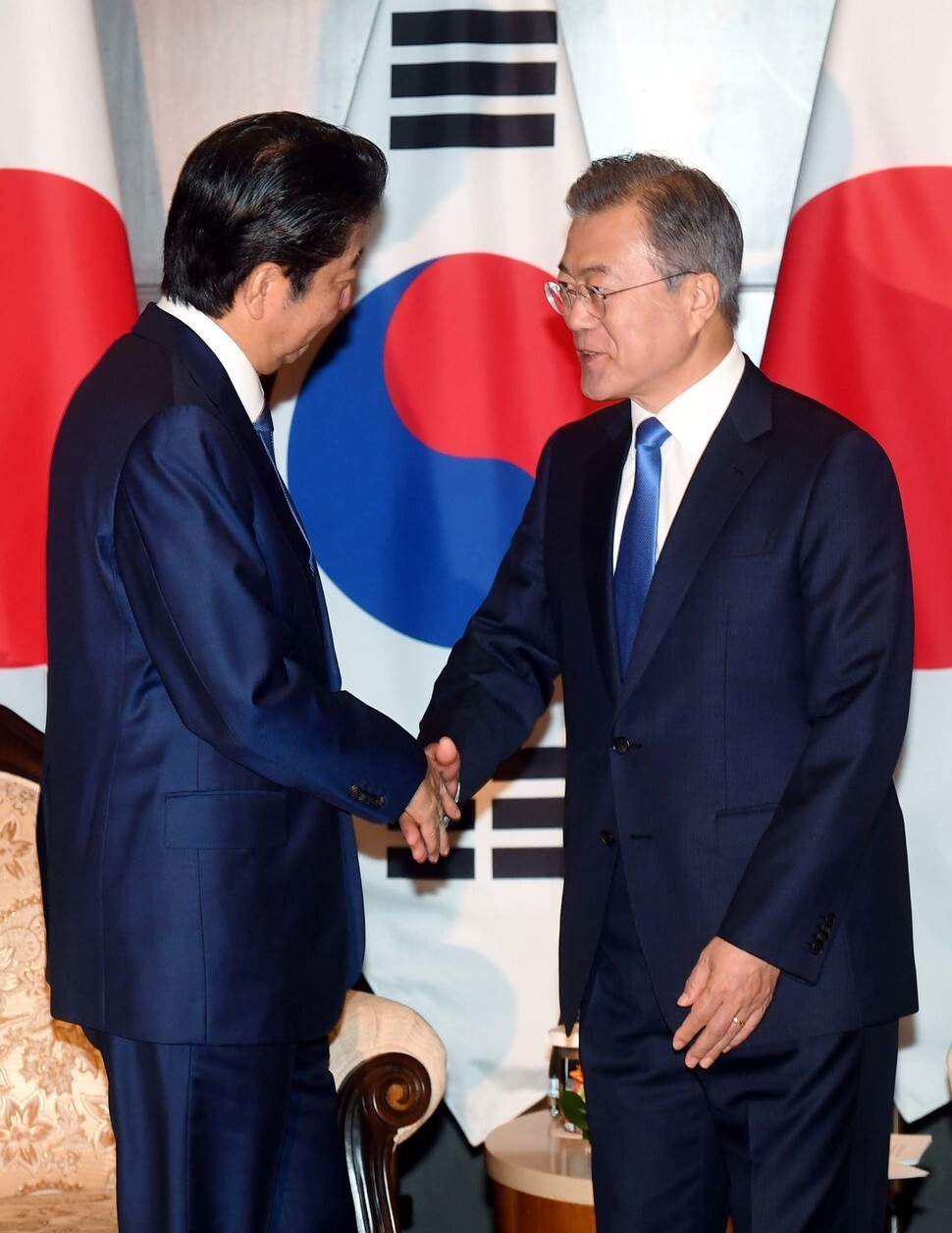hankyoreh
Links to other country sites 다른 나라 사이트 링크
Moon hints to Abe that Reconciliation and Healing Foundation needs to be disbanded

South Korean President Moon Jae-in told Japanese Prime Minister Shinzo Abe on Sept. 25 that the Reconciliation and Healing Foundation established after a previous inter-governmental agreement on the comfort women issue has “failed to function properly due to objections from the comfort women survivors and South Korean public.”
“We need to bring it to a judicious conclusion,” he said in a message interpreted as informing Japan of his intent to disband the foundation, which was formed in the wake of negotiations on the comfort women issue during the Park Geun-hye administration but has struggled to function since then, with most of its board of directors stepping down.
President Moon shared the message with Abe during a 55-minute South Korea-Japan summit that day during their visit to New York for a UN General Assembly session, Blue House spokesperson Kim Eui-kyum explained. With President Moon having informed Abe of the need to disband it, procedures for the foundation’s dismantling appear likely to proceed quickly.
The foundation was originally established with a contribution of 1 billion yen (US$8.9 million) from the Japanese government according to a bilateral agreement on the comfort women issue concluded by the Park Geun-hye administration in Dec. 2015.
During the meeting, Abe “explained Japan’s position on the issues of the comfort women and [Korean] forced laborers,” Kim explained. In response, Moon mentioned the Reconciliation and Healing Foundation issue, while stressing that Seoul had “no plans to abandon its [existing] comfort women agreement or demand renegotiations,” he added.
“There have been issues about evidence suggesting the past [Park] administration attempting to interfere with trials related to demands for damages in connection with imperial Japan’s forced laborers [for Japanese companies],” Moon was also quoted as saying.
“We must respect the courts’ decision on the forced laborers case in view of the separation of powers,” he added.
Around half of the two leaders’ meeting that day was reportedly devoted to the comfort women issue and other historical matters, while the other half involved discussions on the Korean Peninsula’s denuclearization and establishment of peace.
Meanwhile, participants in the 1,354th regular Wednesday demonstration in front of a comfort woman statue near the former Japanese embassy in Seoul on Sept. 26 lamented the government’s failure to fully abandon and renegotiate the 2015 agreement with Japan, but welcomed the disbanding of the Reconciliation and Healing Foundation.
Around 100 people turned out on the last day of the extended Chuseok holiday for the event, which was organized by the group Korean Council for Justice and Remembrance to Resolve the Issue of Japanese Military Sexual Slavery.
“It’s not perfect, but it was a Chuseok gift,” said council representative Yoon Mee-hyang.
“President Moon’s message to the Japanese government that the Reconciliation and Healing Foundation must be disbanded was late in coming, but it represents another step of progress in listening to the demands of the victims,” she added.
The council has been staging one-person demonstrations since August to demand the foundation’s immediate disbanding. On Sept. 3, comfort woman survivor Kim Bok-dong, who is currently battling cancer, staged her own one-person demonstration in a wheelchair amid heavy rain.
Some questions remain as to how far the “judicious conclusion” mentioned by President Moon will go. The comfort women survivors and Korean Council for Justice and Remembrance have insisted on the need to return the one billion yen contribution in “consolation money” from the Japanese government to fund the foundation, and demand “lawful compensation” instead.
“There will need to be follow-up measures to restore the victims’ human rights and honor,” Yoon insisted.
By Kim Bo-hyeop, staff reporter, and Hwang Ye-rang, staff reporters
Please direct comments or questions to [english@hani.co.kr]

Editorial・opinion
![[Editorial] Penalties for airing allegations against Korea’s first lady endanger free press [Editorial] Penalties for airing allegations against Korea’s first lady endanger free press](https://flexible.img.hani.co.kr/flexible/normal/500/300/imgdb/original/2024/0502/1817146398095106.jpg) [Editorial] Penalties for airing allegations against Korea’s first lady endanger free press
[Editorial] Penalties for airing allegations against Korea’s first lady endanger free press![[Editorial] Yoon must halt procurement of SM-3 interceptor missiles [Editorial] Yoon must halt procurement of SM-3 interceptor missiles](https://flexible.img.hani.co.kr/flexible/normal/500/300/imgdb/child/2024/0501/17145495551605_1717145495195344.jpg) [Editorial] Yoon must halt procurement of SM-3 interceptor missiles
[Editorial] Yoon must halt procurement of SM-3 interceptor missiles- [Guest essay] Maybe Korea’s rapid population decline is an opportunity, not a crisis
- [Column] Can Yoon steer diplomacy with Russia, China back on track?
- [Column] Season 2 of special prosecutor probe may be coming to Korea soon
- [Column] Park Geun-hye déjà vu in Yoon Suk-yeol
- [Editorial] New weight of N. Korea’s nuclear threats makes dialogue all the more urgent
- [Guest essay] The real reason Korea’s new right wants to dub Rhee a founding father
- [Column] ‘Choson’: Is it time we start referring to N. Korea in its own terms?
- [Editorial] Japan’s rewriting of history with Korea has gone too far
Most viewed articles
- 1[Editorial] Penalties for airing allegations against Korea’s first lady endanger free press
- 260% of young Koreans see no need to have kids after marriage
- 3Months and months of overdue wages are pushing migrant workers in Korea into debt
- 4Bills for Itaewon crush inquiry, special counsel probe into Marine’s death pass National Assembly
- 5Historic court ruling recognizes Korean state culpability for massacre in Vietnam
- 6In rejecting statute of limitations defense in massacre case, Korean court faces up to Vietnam War a
- 7“Those souls can rest now”: Vietnam massacre survivor reacts to Korean court win
- 8[Reporter’s notebook] In Min’s world, she’s the artist — and NewJeans is her art
- 91 in 3 S. Korean security experts support nuclear armament, CSIS finds
- 10[Editorial] Yoon must halt procurement of SM-3 interceptor missiles